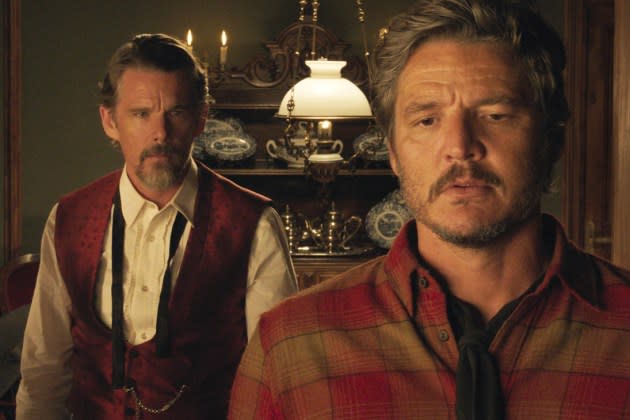‘Strange Way of Life’ Review: Ethan Hawke and Pedro Pascal Heat Up the Desert in Pedro Almodóvar’s Intoxicating Queer Western

Whether Pedro Almodóvar is expressing regret over turning down Brokeback Mountain all those years ago, continuing to dip his toes in English-language projects after The Human Voice or reclaiming the place of gay cowboys in America’s Old West, I am here for it and most definitely won’t be alone.
Premiering in a Special Screening slot in Cannes, Strange Way of Life (Extra?a forma de vida) runs a skimpy half-hour but packs that fleet running time with greater depth of feeling and evocative atmosphere than most directors manage in a full feature. Stir in smoldering turns from Ethan Hawke and Pedro Pascal and you get a flavorful bite to be savored.
More from The Hollywood Reporter
How Sony Classics will maximize the commercial theatrical potential of a film running the length of a TV episode remains a curious question. But the potent combination of two gifted lead actors and a director who’s among the world’s best will make this a must-see curio for many. It won’t hurt, either, that the soulful, sexy short closes with heartfelt words from Pascal’s gunslinger Silva that echo the haunting spell of the queer love story that was one of the most memorable bottle episodes of The Last of Us.
The story, written by Almodóvar, is bare bones but satisfying, even if it leaves you craving an expanded treatment. To the ravishingly plaintive sound of Caetano Veloso singing the fado that gives the film its title, strummed on guitar and lip-synced by rising Spanish heartthrob Manu Ríos, Silva rides across the desert that separates him from the town of Bitter Creek to reunite, for the first time in 25 years, with Sheriff Jake. Back in the wild days of their youth as gunmen for hire, the two shared an idyllic two months of carefree romance and unbridled lust in Mexico.
Silva claims to be in town for a long-overdue catch-up with Jake and to see a doctor about his bad back, but he makes no effort to hide the rekindled embers of his desire. The sheriff wants to keep all that in the past. But after they dine on Jake’s homemade stew and drink too much to hold back, they tumble into bed. The sex is mostly elided but nonetheless quietly sizzling (and with characteristic sly humor, Almodóvar uses a cheeky prelude shot and a day-after wake-up position to leave no doubt as to who’s the top).
The heated interplay between Hawke, doing his best gravel-voiced Clint growl and stern resistance, and Pascal, intensely direct, bristling with unashamedly romantic yearning, is delicious. That’s mirrored in the raw physicality of their earlier years, conjured in separate fireside memories, with Jason Fernández as the young Jake and José Condessa as Silva in a Mexican brothel, shooting holes in a wine sack and guzzling the resulting fountain of vino tinto before devouring each other with equal thirst.
The ulterior motive for Silva’s return is revealed next morning when he’s still basking in afterglow and Jake is once again all business. (I laughed at the latter’s churlish post-coital accusation: “You don’t have a bad back!”) The sheriff is anxious to make an arrest for the murder three days earlier of his late brother’s widow, whose tempestuous relationship with Silva’s dissolute son Joe (George Steane) makes him the prime suspect. Silva has come to intervene on Joe’s behalf, but his loyalties are tested when Jake’s vehemence about staying on the right side of the law leads to a volatile three-way showdown.
The aftermath is Almodóvar at his most fervent, with Alberto Iglesias’ score striking a different tone to his usual work for the director, building masterfully into suspense before soaring into gloriously florid melodrama. The balance of tension and tenderness in the closing scene is exquisite. The final lines, about what two men living on a ranch together could do for each other, are a moving affirmation of queer love flourishing in the least likely places.
As always with Almodóvar, the film is balm for the senses, gracefully shot by DP José Luis Alcaine in the dusty Almería town built for Sergio Leone’s Dollar Trilogy. Even production designer Antxón G?mez’s rustic, early 1900s decor makes room for distinctive design elements, while the costumes courtesy of presenting production banner Saint Laurent by Anthony Vaccarello inject electrifying splashes of color — Silva’s mint-green jacket over a red- and mustard-checked shirt is a killer look — into the prevailing earth tones of the setting.
Aside from one of the melancholy plot strands in the superlative Pain and Glory, it’s been years since Almodóvar made a straight-up gay male love story, a defiant statement of passion that will not be contained. Not to mention a movie of such ripe sensuality — even Jake’s deputy is a dreamboat desk jockey. For that reason alone, queer audiences especially — but not exclusively — should celebrate this precious gift from one of the undisputed greats.
Best of The Hollywood Reporter